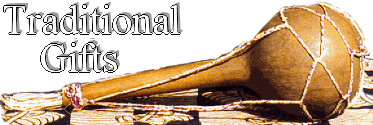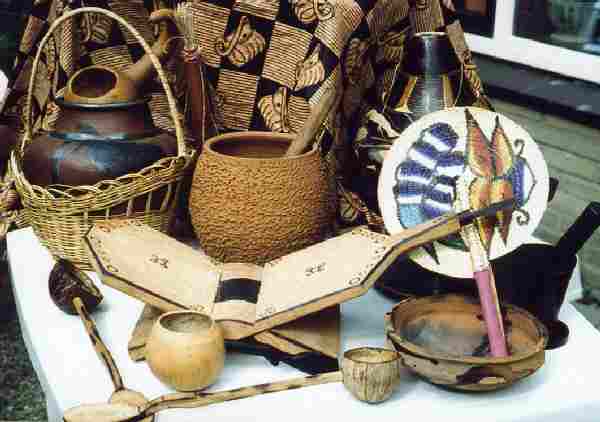
Tanzania - Africa
 |
Traditional Ngoni Wedding gifts Tanzania - Africa |
During the traditional send of party the bride received from her elderly family a tremendous amount of gifts. Explanation and details of these gifts where given by Mrs. Dafrosa P. Wangoma (University of Dar Es Salaam).
Traditional gifts when an African girl, Ngoni in particular, is about to leave from her father's patronage ready for marriage, with all item which she will need in her future home.
Considering that she will be a stranger at the husband's premises, all those she will meet there will be new to her, it will not be easy for her to find all the required items need by the African wife. Normally an African youth does not cook. From birth till he marries all his necessities are taken care of by his family.
When he marries, he moves to a new house which is almost empty. Automatically, the duty of caring for him shifts to the wife. Hence the wife is to equip the house with the necessary items such as a bed, mattresses, cooking utensils etc.
On the send off day, normally the daughter prepares a party to say farewell to the parents, relatives and a neighbours. The relatives present to her all the requirements and explain to her the use of every item though some of them are familiar to her.
The following is a list of the items which your relatives have thought should be presented to you. We have tried to translate them from the Ngoni language to Swahili and English, so that you be in a position to understand them. Some of them are typical African, they even don't have Swahili names. For such items we have tried to explain their usage.
Prepared by Mrs. Dafrosa P.
Wangoma
Data 6th August, 1997

- A few traditional Ngoni wedding gifts -
Also shown on the picture is the coconut grater (9), which is
made out of one piece of wood!
Women are seated on the chair part of the Mbuzi and grate a
coconut using the iron point at the end.
| Ngoni | Swahili | English description | |
| 1 | Kijomela | Kisonjo | Special container used of drinking local brew. |
| 2 | Mpasa | Mkake wa Matete | Mat made from Reeds This is a mat specifically made for drying up foodstuff such as cereals as well as flour. |
| 3 | Lisala | Kibuyy | Calabash Before the introduction of buckets this was used and still is being used in some areas for fetching water. It is also used for preserving cereals lest they be destroyed by pests |
| 4 | Chiviga | Chungu | Cooking Pot This is made from lay. It is one of the most used cooking utensils. It is our belief that food cooked in it preserves its natural taste and flavour. |
| 5 | Kibao cha Chapati | Small roundish table for preparing buns or Chapati. | |
| 6 | Litefu | Mkeka wa Ukindu | Mat Time immemorial this was and is used as a sleeping mate. At the rural areas there are no sofa sets (coaches). When a visitor arrives at your house a male visitor is given a chair (Kigoda) and a female visitor a mat is spread before her to sit on. Most of the homes do not have tables. Food served to guests is put on the mat (Lifefu). |
| 7 | Lituli | Kinu | Wooden
Mortar This is made from a log. It is used for clearing grain, crushing or four mixing vegetable. About 80% of the Tanzanians live in the rural areas. The wooden mortar is the major means for performing the above tasks since not all can afford to pay the rates at the flour mills. Some villages don't have such mills. So maize flour, cassava flour is obtained from crushing the grains in the mortar. |
| 8 | Mtwangilu | Mchi, Mtwagio | Wooden
Pestle This is an instrument used for crushing substances in a mortar. No. 7 and 8 work together. |
| 9 | Kibao cha Mbuzi (a.k.a. Mbuzi) | Coconut
Grater Used to grate Coconut so as to easy squeezing in order to obtain coconut milk, which is a substitute of cooking oil. |
|
| 10 | Chipalu (Kipalu) |
Ungo | Flat Basket This is used to remove husks from grain it is used for winnowing. |
| 11 | Chiheneku | Small flat
Basket |
|
| 12 | Chihulu | Mtungi | Big Pot, an
earthen picther, This is made from clay. It has various uses. In the absence of pails or buckets it is used for fetching water. Very big pots are used for keeping local brew (ugimbi). At times this is used for preserving grains lest they be destroyed by pests |
| 13 | Likung'undu | Chujio la
asili (Kung'uto) |
Sieve This is used to separate large solid things from liquid. |
| 14 | Mpundi | Mwiko | Wooden
paddle This is used for cooking, be it porridge, rice or any type of cooking. |
| 15 | Kawa | Kawa | Conical dish
cover When food is ready to be send to the dunning table, it is put on a tray and is covered with the conical dish cover to keep flies away or dust. |
| 16 | Chigoda | Kigoda | A special
round wooden chair with three legs. It is made from a log. It is mainly used in the kitchen. We do not have tables in our kitchen or electric cookers. So most of the work is done when seated on this chigoda. At times when one has been elected to be the leader of the clan or chief, the ceremony of ordaining him is performed when the so Elected person is seated on this special round chair. |
| 17 | Ligela | Jembe | A hoe This is the major means of tilling the land. More than 80% of the farming in Tanzania is done using a hoe. Very few people us tractors or ploughs for cultivation. |
| 18 | Livhaghu | Shoka | An axe This is used for cutting down trees on the area you intend to be your farm. The cutting of the trees or preparing the areas for farming is done by men, in your case the husband is responsible for clearing the land from trees, thorns and so forth ready for cultivation. At the same time, with exception of new people living in towns, in the rural areas there is no electricity. All the cooking is made by using fire wood and during cold seasons fire is used to warm the house. It is the duty of an African woman to look for fire wood. She has to use an axe to chop the wood. So an axe is used by men for clearing land and by women for cutting firewood. |
| 19 | Upao | Upawa | Wooden ladle Used for lifting liquids out of a container. |
| 20 | Mpyagilu | Ufagio/Fagio | A broom. This is used for sweeping. |
| 21 | Lijiku | Jiko la Mkaa | Charcoal
Stoves Not all can afford to by stove which used kerosene. Most of the people do not have electric cookers. So we use charcoal stoves for cooking. |
| 22 | Lidengu | Kikapu | Basket This has multiple uses. It is used for harvesting, carrying things. |
| 23 | Lijamanda | Jamanda | A special
basket with a lid It is used sometimes as a suitcase. When you go to visit a relative who is for from your home you can't go empty handed. Normally you go carrying flour, rice, beans etc. Theses are all put in the "Jamanda". |
| 24 | Kipepeo | Kipepeo | A Small hand
fan. It is used to keep flies away. When you are together as a sigh of love you use this to fan your spouse. |
| 25 | Chihangaisho | Kihangaisho | A small
round mat. It is an African culture to allow or stay with relatives. These might be your young brothers/Sisters, sister-in-laws, brother-in-laws, your sisters/Brother's children even soon after marriage. This is two forth from the husbands relatives and yours. At times the house might contain more than 10 people. To cook delicious food for all every day, is not possible. It is the responsibility of the wife to cook special food for the husband. You know after the "Match" he looses a lot of energy. This must restored by a very delicious and nutritious food. This food is eaten when seated on the "Kihangaisho". |
| 26 | Mzamu | Kibanio | This is to support the cooking pot from moving from the cooking stove while cooking porridge |
| 27 | Mkambu | A special
pot or container for bathing for bathing water. It is
used by the couples only. Normally after dinner the wife
prepares water for the husband to bath. We do not have
showers. The wife has to pour water on the husband's body
using a small calabash (28. Ndevhe - Kata). She has to
help him with the bathing. |
|
| 28 | Ndevhe | Kata | A small calabash |
| 29 | Chipalu cha Watu | A special
tray for couples only. Contains "Cheheneku and
Mkele" This is a special tray for serving the feed which is eaten when seated on the "Kihangaisho". Food is served on the "Kiheneku" which is a small flat basket. Vegetable is served in the "Mkele" which is most cases is an earthen bowl. |
|
| 30 | Mkele | Bakuli | Earthen bowl. |
| 31 | Kitunga | Kitunga | This can be used for serving bread, fruits. |